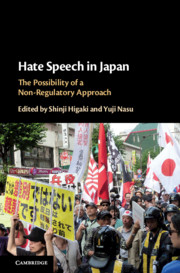Book contents
- Hate Speech in Japan
- Hate Speech in Japan
- Copyright page
- Contents
- Tables
- Figures
- Contributors
- Acknowledgements
- Abbreviations
- Introduction
- Part I Outline
- Part II History
- Part III Legal Framework
- Part IV Cases
- Part V Multidisciplinary Debates
- Part VI Current Issues
- 18 Hate Speech on the Internet
- 19 Hate Groups and the Use of Public Facilities
- 20 Hate Speech in the Mass Media
- Book part
- Index
19 - Hate Groups and the Use of Public Facilities
Striking a Balance between the Right to Assembly and the Interests of Minority Residents
from Part VI - Current Issues
Published online by Cambridge University Press: 15 January 2021
- Hate Speech in Japan
- Hate Speech in Japan
- Copyright page
- Contents
- Tables
- Figures
- Contributors
- Acknowledgements
- Abbreviations
- Introduction
- Part I Outline
- Part II History
- Part III Legal Framework
- Part IV Cases
- Part V Multidisciplinary Debates
- Part VI Current Issues
- 18 Hate Speech on the Internet
- 19 Hate Groups and the Use of Public Facilities
- 20 Hate Speech in the Mass Media
- Book part
- Index
Summary
After the surge of hate speech by far-right groups in the late 2000s, several such groups sought to use local public facilities to promulgate hate speech chiefly against Koreans resident in Japan. This led local governments to confront the difficult question of how to strike a balance between freedom of assembly (and expression), on the one hand, and the interests of minority residents, on the other. In this chapter, it is argued that local governments can sometimes refuse hate groups use of their facilities to protect local minority residents and that the guidelines issued by some local governments are constitutional despite some notable defects. Many constitutional law scholars in Japan will certainly oppose this conclusion, but this chapter contends that their position cannot be supported, because it overcategorizes conflicting interests and abstracts highly complex factors. It must be recognized that there are exceptions to free speech protections in relation to certain categories of hate speech. Some cases on the use of public facilities by hate groups constitute an example of such exceptions, because certain uses will clearly harm minority residents and thereby contravene the public purpose of establishment and operation of those facilities.
Information
- Type
- Chapter
- Information
- Hate Speech in JapanThe Possibility of a Non-Regulatory Approach, pp. 425 - 455Publisher: Cambridge University PressPrint publication year: 2021
